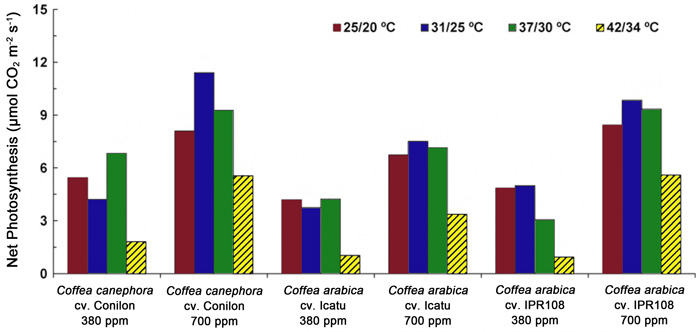| Follow @co2science |
Paper Reviewed
Rodrigues, W.P., Martins, M.Q., Fortunato, A.S., Rodrigues, A.P., Semedo, J., Simoes-Costa, M.C., Pais, I.P., Leitao, A.E., Colwell, F., Goulao, L., Maguas, C., Maia, R., Partelli, F.L. Campostrini, E., Scotti-Campos, P., Ribeiro-Barros, A.I., Lidon, F.C., Damatta, F.M. and Ramalho, J.C. 2016. Long-term elevated air [CO2] strengthens photosynthetic functioning and mitigates the impact of supra-optimal temperatures in tropical Coffea arabica and C. canephora species. Global Change Biology 22: 415-431.
In a study of two coffee species (C. Arabica and C. canephora) that had been growing for a year and a half in 28-L pots (which posed no root restrictions) within walk-in chambers maintained at day/night temperatures of 25/20°C in air of either 380 or 700 ppm CO2, Rodrigues et al. (2016) allowed temperatures to rise from those initial values to 42/34°C at a rate of 0.5°C per day, with seven days of stabilization at 31/25, 37/30 and 42/34°C, after each of which stabilizations they measured a number of important plant properties. And what did they thereby learn?
Among other findings, the 19 researchers from Portugal and Brazil report that elevated CO2 (1) strongly mitigated the negative impact of temperature on both species, particularly at 42/34°C (see Figure 1 below), that it (2) promoted higher water-use efficiency under moderately higher temperatures (31/25°C), that it (3) did not provoke photosynthetic down regulation, but that it rather (4-6) strengthened photosynthetic photochemical efficiency, energy use and biochemical functioning at all temperatures.
In concluding, Rodrigues et al. say their findings "offer novel and timely results concerning the remarkable mitigating effects of elevated CO2 on the presumable harmful effects of supra-optimal temperatures on the photosynthetic pathway in coffee plants," which facts lead them to state that "future perspectives on the sustainability of the coffee crop that are based on rising temperature scenarios should not be as catastrophic as previously predicted." In actuality, they look to be quite positive!

Figure 1. Net photosynthesis of Coffea canephora cv. Conilon (CL153) and Coffea arabica (Icatu and IPR108) plants grown under 380 or 700 ppm CO2 and control (25/20°C, day/night) or supra-optimal temperatures of 31/25, 37/30 and 42/34°C. Adapted from Rodrigues et al. (2016).




